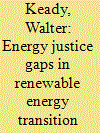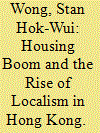| Srl | Item |
| 1 |
ID:
181783


|
|
|
|
|
| Summary/Abstract |
This study examines how renewable energy policies in Vermont address energy vulnerability and energy justice. Using an anti-resilience framework, and drawing on 569 surveys and 18 interviews statewide, our results demonstrate higher energy vulnerability—lack of access to sufficient and affordable energy—among respondents who are low-income, non-white, and renters. Low-income and renter respondents were over three times more likely, and non-white respondents were seven times more likely, to report going without heat. While Vermont is regarded as a renewable energy leader, its current policies do not equitably distribute household transition benefits (HTBs) to address vulnerability. Our results show that non-white respondents were seven times less likely than white respondents to report having solar panels and renters were three times less likely than homeowners to report having solar panels. Interviews also reveal HTBs are available mostly to high-income households. We argue that these disparities may result from structural discrimination and policies that distribute HTBs to households with disposable income and property rights. The unequal distribution of this ‘investment capital’ prevents widespread access for non-white, low-income, and renting households. Following an anti-resilience framework, we propose alternative policy frameworks that center justice within energy transition policy making.
|
|
|
|
|
|
|
|
|
|
|
|
|
|
|
|
| 2 |
ID:
162095


|
|
|
|
|
| Summary/Abstract |
Localist parties have become an emerging force in Hong Kong’s political landscape. What has caused the rise of localism in the city? Extant studies focus on cultural and social factors. In this article, we propose a political economy explanation: global and regional economic factors have caused a housing boom in Hong Kong since the mid-2000s and produced impactful redistributive consequences. While homeowners benefit tremendously from the hike in asset prices, non-homeowners stand to lose. Their divergent economic interests then translate into political preferences; homeowners support political parties that favour the status quo, while non-homeowners tend to support those that challenge it. Using a newly available public opinion survey, we find preliminary evidence in support of our argument. In particular, homeowners are less likely to identify with localist parties and tend to vote for pro-establishment ones. High-income earners, however, are more likely to vote for localist parties.
|
|
|
|
|
|
|
|
|
|
|
|
|
|
|
|
| 3 |
ID:
153302


|
|
|
|
|
| Summary/Abstract |
SINCE 1986 the number of UK households renting privately has increased from 1.85 million to 5.3 million. This private landlord renaissance has been supported by buy to let investment, tax concessions, subsidies, light touch regulation, the right to buy scheme and housing benefit. However, private landlordism makes only a small contribution to new housing supply, characterised by low quality, adds to state expenditure, increases social inequality and has a negative impact on family life. Following the stark revelation of ‘two Englands’ in the Brexit vote, ways to curb the sector's growth need to have a higher place on the political agenda.
|
|
|
|
|
|
|
|
|
|
|
|
|
|
|
|